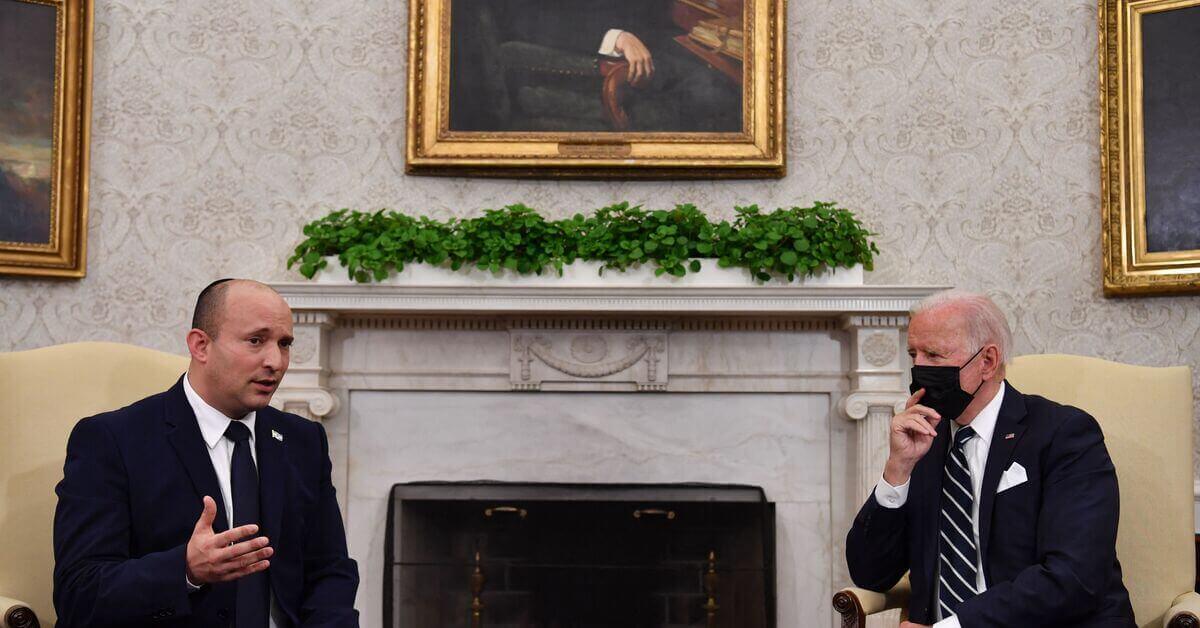Israeli Prime Minister Naftali Bennett met United States (US) President Joe Biden on Friday during his first official tour to Washington. The leaders discussed bilateral ties and other issues, including Iran’s nuclear programme, the Israel-Palestine conflict, and the Afghan crisis.
From August 24-29, Bennett also held talks with Secretary of State Antony Blinken and Secretary of Defence Lloyd Austin III.
Meeting with Joe Biden
Bennett met with Biden at the Oval Office on Friday, a day after the meeting was scheduled. The meeting was postponed due to the suicide bombings near the Kabul airport that killed almost 200 people, including 13 US troops.
A White House statement mentioned that the meeting was meant to “reaffirm the historic partnership between the United States and Israel and consult on the full range of global and regional challenges facing the two countries.”
The leaders also discussed the ongoing tensions with Iran regarding its nuclear programme. “The President made clear his commitment to ensuring Iran never develops a nuclear weapon,” the statement read. It added that the leaders “reviewed steps to deter and contain” Tehran’s dangerous regional behaviour. “They reiterated their commitments to work constructively and deepen cooperation to address all aspects of Israel’s security against Iran and other threats,” the White House noted.
In this regard, Biden affirmed the US’ “ironclad support” for Israel’s security and right to self-defence. He also underscored his administration’s “full support for replenishing Israel’s Iron Dome system.”
Bennett welcomed Biden’s statements on Israel’s right to defend itself and the US’ commitment to halt “Iran’s race to a nuclear weapon.” However, Bennett stated that if the diplomatic route does not work, Israel had “other options” as well, a possible reference to military strikes against Iranian nuclear facilities. “These very days illustrate what the world would look like if a radical Islamic regime acquired a nuclear weapon. That marriage would be a nuclear nightmare for the entire world,” he said.
Calling Iran the “world’s number one exporter of terror,” Bennett said, “The Iranians are spinning their centrifuges in Natanz and Fordow right now. We have got to stop them [and] we [US and Israel] we have developed a comprehensive strategy with two goals.” “The first goal is to stop Iran’s regional aggression and start rolling it back into the box. And the second is to permanently keep Iran away from ever being able to break out to a nuclear weapon,” the Israeli PM noted.
Moreover, the duo stressed on the importance of advancing “peace, security, and prosperity for both Israelis and Palestinians.” Biden urged Bennett to take more significant steps to improve the lives of Palestinians and provide better economic opportunities for them. He underscored “the importance of refraining from actions that could exacerbate tensions, contribute to a sense of unfairness, and undermine efforts to build trust.” Biden added that a “negotiated two-state solution” is the only “viable path” to achieving long-lasting peace between Israel and Palestine.
Bennett also extended Israel’s “condolences and deep sadness for the loss of American lives in Kabul.” He said the sacrifice of American service members “is the very definition of courage and sacrifice.”
On Sunday, sources told The Times of Israel that Bennett was considering proposing the US government with Israeli assistance in resettling Afghan refugees from the US bases to a third country. However, the sources confirmed that Israel was not seeking to resettle any refugees within its borders, and that the proposal is “still in flux.”
The leaders also discussed Israel’s “strong and expanding” relations with its Arab neighbours, COVID-19 cooperation, and economic ties.
Discussions with Antony Blinken and Llyod Austin III
Bennett met the US secretaries of State and Defence, Antony Blinken and Lloyd Austin III, on Wednesday.
Blinken discussed the Iranian nuclear deal and the Israeli-Palestinian conflict with Bennett and ways to solve the issues. Bennett thanked Blinken for the US’ support of Israel and assured him that the US had no friend “more reliable and appreciative” than Israel.
In his meeting with Defence Secretary Austin to discuss Israel-US military cooperation and reaffirm both countries’ “strategic partnership.” Both sides underscored the need to address “regional security challenges together” and “agreed to cooperate on air and missile defence and to counter unmanned aerial systems.”
The Pentagon stated that the duo talked about cooperation against terrorism, threats posed by Iran’s nuclear programme and its maritime aggression. “The leaders agreed to continue to strengthen close coordination between the two countries’ defence establishments in support of these objectives,” it stated.
Before he departed from Washington on Sunday, Bennett called the visit “successful” and said he created a “direct and personal connection” with Biden.

